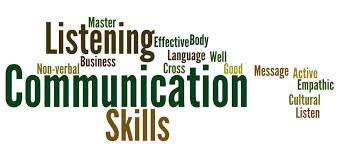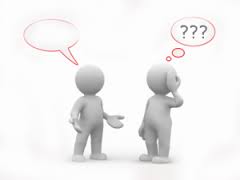Listening intends to pay regard and following up on what somebody is stating. Neither listening intends to just keeping up a pleasant hush while you are practicing in your brain the discourse you are going to set aside a few minutes you can get a conversational opening, nor does listening mean holding up vigilantly for the defects in the other individual’s contention so that later you can cut him down. Listening intends to attempt to see the issue the way the speaker sees it-which implies not sensitivity, which is feeling for him, yet sympathy, which is encountering with him. Listening obliges entering effectively and innovatively into the other individual’s circumstance and attempting to comprehend a casing of reference not the same as your own. This is not generally a simple errand.
Significance of listening at a work environment
Viably listening in the working environment is the non-verbal type of correspondence. At the point when one settles on a choice to listen to someone, one does it with full, unified consideration. Complete consideration and fixation, towards the speaker’s subject, conveys one’s worry to the speaker. Along these lines, adequately listening in the working environment, serves as a non-verbal specialized apparatus. Corporate associations are requesting and testing. While the greater part of us adapt up to the weights, it is constantly a listening ear that gives one to bear on.
Understanding
Representatives who deal with their listening aptitudes discover it simpler to decipher importance from discussions. Some piece of great listening is paying consideration on the setting the speaker is utilizing and having the capacity to put everything that is being said into that connection. It additionally means making inquiries to focus importance instead of speculating somebody’s plans. Legitimately deciphering data from a discussion can enhance a worker’s association with customers and help to expand income through rehash deals. A customer frequently lean towards merchants who take the time to appropriately comprehend the setting and significance of a discussion.
Learning
Learning is the wide term used to characterize the data and encounters a representative increases from listening to what is being said. Preparing is an organized piece of learning. The other piece of learning is the capacity to listen to guidance and other data, and know how to utilize that data viably as a part of future circumstances. At the point when a representative experiences an experience, it can be an important lesson in enhancing gainfulness or client relations. Urge your representatives to grow great listening abilities that will help them assemble data that can add to the learning background.
Complete Information
Great listening aptitudes help a worker to focus when she has the majority of the data she needs on a theme or on the off chance that she needs to request further information. For instance, a client is attempting to give back an item on the grounds that he says the item does not work. A representative’s solid listening aptitudes will hear a typical client circumstance and start to ask the client to depict the issue. Further listening and elucidation drives the representative to reason that the client is utilizing the item mistakenly and to support the client in the best possible working methods. Refined listening aptitudes help a worker to have the capacity to figure out what he is not hearing, which demonstrates missing data.
Errors about Listening
Among the immense obstructions to compelling listening are the deceptions that individuals hold about tuning in. These false thoughts frequently cause individuals to have swelled sentiments they could call their own listening execution. Accepting that they have no issue with tuning in, they endeavor to move forward. Without a doubt, why would it be a good idea for them to? Not realizing that their listening expertise is “bankrupt,” they see no compelling reason to “alter” it. Subsequently, they don’t make moves to progress. Thinking about these errors will aid you in dodging this trap. Here, then, are a few of the basic ones.
Paradox #1: Listening Is Not My Problem!
Individuals by and large accept they are preferable audience members over people around them. It is the individuals they work for, the ones who work with or for them, their relatives, and their companions who have an issue in listening viably not them.
The individuals around us accept that we have all the more an issue listening adequately than they do. This ought to let us know something. Listening is not simply another person’s issue its our own.
Deception #2: Listening and Hearing Are the Same
Basically having great hearing does not make one a decent audience. Truth be told, numerous individuals who have superbly great hearing are bad audience members. Having great hearing does encourage one’s impression of sound; however great audience members don’t just hear words—they concentrate on the importance. We speak successfully with one another insofar as we impart significance.
The contrast in the middle of listening to and listening can be expressed along these lines: Hearing is the gathering of sound, listening is the connection of intending to the sound. Hearing is inactive, listening is dynamic. Understanding the distinction in the middle of listening to and listening is a critical essential for listening viably.
Deception #3: Good Readers Are Good Listeners
This announcement is frequently untrue, despite the fact that both perusing and listening rely on upon the interpretation of words into significance. In view of the imparted interpretation capacity, there is clearly a relationship in the middle of perusing and tuning in; the issue is, numerous individuals erroneously accept that all great perusers are essentially great audience members.
Error #4: Smarter People Are Better Listeners
Clearly, insight assumes a part in a man’s ability to tune in. Persons with restricted brainpower will be constrained in their ability to process the data contained in messages they get. Alternately, those having high brainpower levels will have a more prominent preparing limit. Yet, the conviction that “more astute individuals are better audience members” is regularly false. Actually, confirmation proposes that the converse is regularly genuine.
Misrepresentation #5: Listening Improves with Age
Absolutely, the limit or capacity to listen and join proper intending to messages enhances with age and involvement with slightest in the early years and at any rate to some point. Albeit listening capacity expands, listening execution by and large decays eventually. However this doesn’t need to be the situation. The error between listening capacity and listening execution is regularly because of our having adapted awful listening propensities.
Misrepresentation #6: Listening Skills Are Difficult to Learn
Really, the abilities themselves are not too troublesome and starting advancement is fast. However figuring out how to apply the aptitudes reliably does take diligent work. What’s more, getting to be truly capable takes much time and practice—a lifetime to be correct. In any case the exertion is without a doubt advantageous. The last section will let you know how to improve as an audience in any circumstance. To start with, notwithstanding, we have to comprehend the procedure of listening and the sorts of tuning in.
Enhancing Listening Comprehension:
1. Minimize both inward and outer diversions. You can’t generally dispose of a cerebral pain, however you can close the windows if the driver of a truck is outside revving his motor.
2. Adjust your listening to the circumstance. In case you’re listening to an address for an exam in Biology class, you’ll need to give careful consideration than in case you’re viewing the neighborhood news. In the previous circumstance, you’ll presumably take notes.
3. Show you’re listening by your nonverbal correspondence. You may gesture, shake your head, or raise your eyebrows. Alter your carriage appropriately. Look.
4. If you’re listening to a discourse or going to a professional, focus the most critical focuses and add to a strategy to recall that them. You may rehash them rationally or even scribble them down quickly.
5. When you’re listening to a companion with an issue, exhibit sympathy. Demonstrate her you comprehend what she is experiencing.
6. Realize that individuals don’t essentially need you to tackle their issue. They might just need to impart how they are feeling. Spare guidance for some other time, unless you’re requested it.
7. Don’t intrude. Let the individual completion what he is stating before you clarify your perspective or make inquiries.
8. Don’t prejudge a man’s message by the way he looks. You can take in something from very nearly anybody.
9. Stay concentrated on the subject. It’s anything but difficult to let your brain meander, particularly if the subject isn’t critical to you. Train yourself to focus.
10. Remain perceptive, regardless of the fact that the theme is enthusiastic. Maybe somebody is examining the triumphs of the late decision, and you were enthusiastic around a losing competitor. At the point when feelings get to be included, you may wind up amidst a yelling match, which will resolve nothing. Present your focuses serenely.
Click here for government certification in Life Skills
Click here for government certifications





23 Comments. Leave new
Long winded but well written ..
Amazing. I could just remember it is said that your ears don’t get you in trouble, your words can. 🙂
It’s not said without a reason, you have 2 ears to listen and only 1 mouth to speak so listen more and speak less!
It can be more precise. But yes no doubt good efforts.
Interesting choice of topic…good one
nice article
The choice of topic was amazing!
Nice and well explained article
To listen you need a skill, It is important to listen in every aspect of life 🙂
good one 🙂
Very nice article
Anazing article!
well written!
Pretty good job
One can learn so much just be listening
Nice topic .
listening others give you insight how others see the world.
Listening skills form an integral component of the personality of people.
This is not surprising when you consider that good listening skills can lead to: better customer satisfaction, greater productivity with fewer mistakes, increased sharing of information that in turn can lead to more creative and innovative work.
The power of listening unveiled… nice
nice…
Amazing article!
Words once spoken cannot be taken back!
well articulated